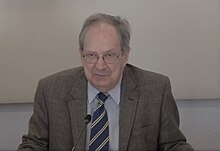José Carlos Mainer
José Carlos Mainer | |
|---|---|
 | |
| Born | 11 July 1944 Zaragoza |
| Occupation | Literary critic, literary historian |
| Employer | |
| Awards | |
| Position held | professor |
José Carlos Mainer Baqué (born 1944) is a Spanish historian of literature and literary critic,[1] Professor Emeritus of the University of Zaragoza (UNIZAR).[2] He is credited for his interdisciplinary scholar work intermingling studies on cultural and literary history.[3]
Biography
Born in 1944 in Zaragoza,[1] he earned a PhD in Philosophy and Arts from the University of Barcelona (UB).[4] Author of the pioneer Falange and literatura in 1971, his work regarding the study of literary fascism has been described as "exculpatory" towards the Falangist authors involved.[5] He worked as lecturer at the UB, the Autonomous University of Barcelona (UAB) and the University of La Laguna (ULL)[4] before obtaining a Chair in Literary History of the University of Zaragoza (UNIZAR) in 1982.[6] He retired from teaching in 2011 and remains active as writer, critic and lecturer and collaborates with the newspapers El Pais and ABC.
Awards and recognitions
In December 2002 he was granted by the Diputación General de Aragón the second edition of the 'Premio de las Letras Aragonesas'.[7] In 2004 he was awarded with the journalism prize for the cultural, ethic and democratic values from the Basque Country by the newspaper El Correo.[8] In 2011, in the year of his retirement as a professor at the University of Zaragoza, the book Para Mainer de sus amigos y compañeros de viaje[9] has been edited.
Works
- Author
- — (1971). Falange y literatura. Barcelona: Labor.[n. 1]
- — (1972). Literatura y pequeña burguesía en España.[4]
- — (1975). La Edad de Plata.[4]
- — (1989). Historia, literatura, sociedad.[4]
- — (1989). La corona hecha trizas, 1930-1960. Barcelona: PPV.[11]
- — (1994). De posguerra, 1951-1990. Barcelona: Crítica.[12]
- — (2000). La escritura desatada. El mundo de las novelas.[13]
- — (2003). La filología en el purgatorio. Los estudios literarios en torno a 1950. Barcelona: Crítica.[14]
- — (2004). La doma de la quimera. Ensayos sobre nacionalismo y cultura en España. Madrid: Iberoamericana/Vervuert.[15]
- — (2005). Tramas, libros, nombres: para entender la literatura española, 1944-2000. Barcelona: Anagrama.[16][17]
- — (2006). Años de vísperas. La vida de la cultura española, 1931-1939. Madrid: Espasa-Calpe.[18]
- — (2012). Pío Baroja. Madrid: Taurus.[19]
- — (2014). Historia mínima de la literatura española. Madrid & México: Turner-El Colegio de México.[20][21]
- Director
- Mainer, José-Carlos, ed. (2010–2013). Historia de la literatura española. Barcelona: Crítica. (9 volumes)[20]
References
- Informational notes
- Citations
- ^ a b Robles, Fermín (18 December 2005). "Mainer analiza la literatura española de 1944 a 2000 en su último libro". El País.
- ^ "'Historia mínima de la literatura española', un relato razonado de nuestras letras". www.20minutos.es. 20minutos. 26 February 2014.
- ^ Geli, Carles (27 March 2010). "La historia de la literatura española se ha parcelado demasiado". El País.
- ^ a b c d e "La invención de la Literatura española" (PDF). recursos.march.es. p. 33.
- ^ Becerra Mayor 2012, p. 40.
- ^ Ordovás, Julio José (3 September 2011). "La biblioteca del Nautilus". El País.
- ^ Monserrat, Concha (18 December 2002). "José Carlos Mainer recibe el Premio de las Letras Aragonesas". El País. El Pais. Retrieved 18 December 2002.
- ^ "Los valores culturales, éticos y democráticos del País Vasco". elcorreo.com. El Correo.
- ^ "Para Mainer de sus amigos y compañeros de viaje". comares.com. Editorial Comares.
- ^ Núñez Florencio 2013.
- ^ Calvo Carilla 1990, p. 201–203.
- ^ Rehrmann 1996, p. 101–103.
- ^ Catelli, Nora (12 November 2005). "La lección de Mainer". El País.
- ^ Sánchez Robayna 2004, p. 36–37.
- ^ Gracia 2005.
- ^ Lluch Prats 2008, p. 185–191.
- ^ Basanta 2006.
- ^ Gracia 2006.
- ^ Ridao 2012.
- ^ a b Fuster 2014.
- ^ Andú 2015, pp. 188–191.
- Bibliography
- Andú, Fernando (2015). "Mainer, José-Carlos (2014). Historia mínima de la literatura española. Madrid-México D. F.: Turner-El Colegio de México, 276 p." Dirāsāt Hispānicas. Revista Tunecina de Estudios Hispánicos (in Spanish) (2): 188–191. ISSN 2286-5977. Retrieved 2019-10-26.
- Basanta, Ángel (1 August 2006). "Tramas, libros, nombres: para entender la literatura española - José-Carlos Mainer". Revista de Libros. Retrieved 2019-10-26.
- Becerra Mayor, David (2012). "El revival fascista o la redención por la vía de la estética" (PDF). Revista de Crítica Literaria Marxista (6). Madrid: Fundación de Investigaciones Marxistas.
- Calvo Carilla, José Luis (1990). "J. C. Mainer, La Corona hecha trizas (1930-1960)". Castilla: Estudios de Literatura (15): 201–203. ISSN 1133-3820. Retrieved 2019-10-26.
- Fuster, Francisco (3 June 2014). "Mainer en monodosis". Revista de Libros.
- Gracia, Jordi (29 January 2005). "Nacionalistas y españoles". El País.
- Gracia, Jordi (1 July 2006). "Crítica | El destierro piadoso de los tópicos". El País. ISSN 1134-6582. Retrieved 2019-10-26.
- Lluch Prats, Javier (2008). "José-Carlos Mainer, Tramas, libros, nombres. Para entender la literatura española, 1944-2000" (PDF). Olivar. 9 (11): 185–191. ISSN 1852-4478. Retrieved 2019-10-26.
- Núñez Florencio, Rafael (15 November 2013). "Falange y literatura". El Cultural. Retrieved 2019-10-26.
- Rehrmann, Norbert (1996). "Review of De postguerra (1951-1990)". Notas: Reseñas iberoamericanas. Literatura, sociedad, historia. 3 (9): 101–103. ISSN 0945-8301. JSTOR 43116524.
- Ridao, José María (17 April 2012). "Crítica | Pío Baroja desde su obra". El País. ISSN 1134-6582. Retrieved 2019-10-26.
- Sánchez Robayna, Andrés (2004). "La tradición liberal española hacia 1950". Revista de Libros (95): 36–37. ISSN 1698-532X. JSTOR 30230439.
